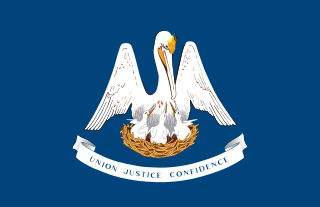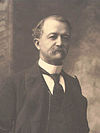
The United States presidential election of 1876 was the 23rd quadrennial presidential election, held on Tuesday, November 7, 1876. It was one of the most contentious and controversial presidential elections in American history, and is known for being the catalyst for the end of Reconstruction. Republican nominee Rutherford B. Hayes faced Democrat Samuel J. Tilden. After a controversial post-election process, Hayes was declared the winner.

The United States presidential election of 1852 was the seventeenth quadrennial presidential election, held on Tuesday, November 2, 1852. Democrat Franklin Pierce, a former Senator from New Hampshire, defeated General Winfield Scott, the Whig nominee. This was the last election in which the Whigs served as the principal opposition to the Democrats.
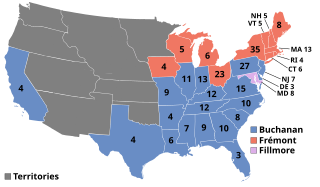
The United States presidential election of 1856 was the 18th quadrennial presidential election, held on Tuesday, November 4, 1856. In a three-way election, Democrat James Buchanan defeated Republican nominee John C. Frémont and American Party nominee Millard Fillmore.

The 1860 United States presidential election was the nineteenth quadrennial presidential election to select the President and Vice President of the United States. The election was held on Tuesday, November 6, 1860. In a four-way contest, the Republican Party ticket of Abraham Lincoln and Hannibal Hamlin emerged triumphant. The election of Lincoln served as the primary catalyst of the American Civil War.

The United States presidential election of 1888 was the 26th quadrennial presidential election, held on Tuesday, November 6, 1888. Republican nominee Benjamin Harrison, a former Senator from Indiana, defeated incumbent Democratic President Grover Cleveland of New York. It was the third of five U.S. presidential elections in which the winner did not win a plurality or majority of the national popular vote.
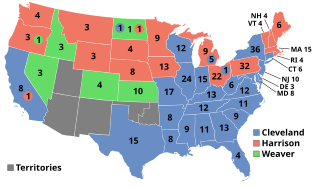
The United States presidential election of 1892 was the 27th quadrennial presidential election, held on Tuesday, November 8, 1892. In a re-match of the closely contested 1888 presidential election, former Democratic President Grover Cleveland defeated incumbent Republican President Benjamin Harrison. Cleveland's victory made him the first and to date only person in American history to be elected to a non-consecutive second presidential term. It was also the first of two times that an incumbent was defeated in two consecutive elections.

The United States presidential election of 1904 was the 30th quadrennial presidential election, held on Tuesday, November 8, 1904. Incumbent Republican President Theodore Roosevelt defeated the Democratic nominee, Alton B. Parker. Roosevelt's victory made him the first president to win a term in his own right after having ascended to the presidency upon the death of a predecessor.

The United States presidential election of 1908 was the 31st quadrennial presidential election, held on Tuesday, November 3, 1908. Secretary of War and Republican Party nominee William Howard Taft defeated three-time Democratic nominee William Jennings Bryan.

The 1952 United States presidential election was the 42nd quadrennial presidential election. It was held on Tuesday, November 4, 1952. Republican Dwight D. Eisenhower won a landslide victory over Democrat Adlai Stevenson, ending a string of Democratic Party wins that stretched back to 1932.

Murphy James Foster was a Louisiana politician who served two terms as the 31st Governor of Louisiana from 1892 to 1900. Foster adopted the Louisiana Constitution of 1898, which effectively disfranchised the black majority, who comprised most of the Republicans, thus leading to Louisiana's becoming essentially a one-party (Democratic) state for several generations and excluding African Americans from the political system.

The three 1860 Democratic National Conventions were crucial events in the lead-up to the American Civil War. The first Democratic national convention adjourned in deadlock without choosing candidates for President and Vice President. A second official convention nominated Senator Stephen A. Douglas of Illinois for President and former Senator Herschel V. Johnson of Georgia for Vice President. A third, “rump,” convention, primarily Southerners, nominated Vice President John C. Breckinridge for President and Senator Joseph Lane of Oregon for Vice President.

The 1964 United States Senate elections coincided with the election of President Lyndon B. Johnson by an overwhelming majority, to a full term. His Democratic Party picked up a net two seats from the Republicans. As of 2019, this is the last time either party has had a two-thirds majority in the Senate, which would have hypothetically allowed the Senate Democrats to override a veto, convict and expel certain officials, or invoke cloture without any votes from Republicans. The Senate election coincided with Democratic gains in the House in the same year.
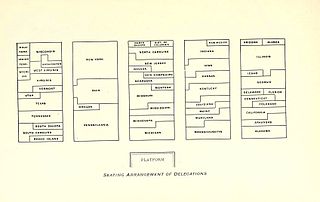
The 1896 Democratic National Convention, held at the Chicago Coliseum from July 7 to July 11, was the scene of William Jennings Bryan's nomination as the Democratic presidential candidate for the 1896 U.S. presidential election.

Jared Young Sanders Sr. was an American journalist and attorney from Franklin, the seat of St. Mary Parish in south Louisiana, who served as his state's House Speaker (1900–1904), lieutenant governor (1904–1908), the 34th Governor (1908–1912), and U.S. representative (1917–1921). Near the end of his political career he was a part of the anti-Long faction within the Louisiana Democratic Party. Huey Pierce Long Jr., in fact had once grappled with Sanders in the lobby of the Roosevelt Hotel in New Orleans.

Robert Charles Wickliffe was Lieutenant Governor and the 15th Governor of Louisiana from 1856 to 1860.

The 1900 National Convention of the Republican Party of the United States was held June 19 to June 21 in the Exposition Auditorium, Philadelphia, Pennsylvania. The Exposition Auditorium was located south of the University of Pennsylvania, and the later Convention Hall was constructed along the building's east wall. It was demolished in 2006.
In United States politics, a brokered convention can occur during a presidential election when a political party fails to choose a nominee on the first round of delegate voting at the party's nominating convention.
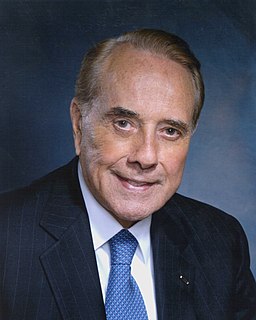
The 1996 Republican presidential primaries were the selection process by which voters of the Republican Party chose its nominee for President of the United States in the 1996 U.S. presidential election. Former Senator Bob Dole of Kansas, former Senate Majority Leader was selected as the nominee through a series of primary elections and caucuses culminating in the 1996 Republican National Convention held from August 12 to August 15, 1996, in San Diego, California.
George L. Walton (1850-1941) was President of the Louisiana State Senate and Acting Lieutenant Governor of Louisiana from 1881 to 1884 serving under Governor Samuel D. McEnery.

The Louisiana gubernatorial election of 1896 was held on April 21, 1896. Like most Southern states between Reconstruction and the civil rights era, Louisiana's Republican Party was virtually nonexistent in terms of electoral support. As Louisiana had not yet adopted party primaries, this meant that the Democratic Party convention nomination vote was supposed to be the real contest over who would be governor. However, the Republicans and Populists put forward a joint candidate, John N. Pharr. With combined Republican and Populist support Pharr garnered 43% of the vote, although the Democratic nominee, Murphy J. Foster was elected with 57% of the vote.

